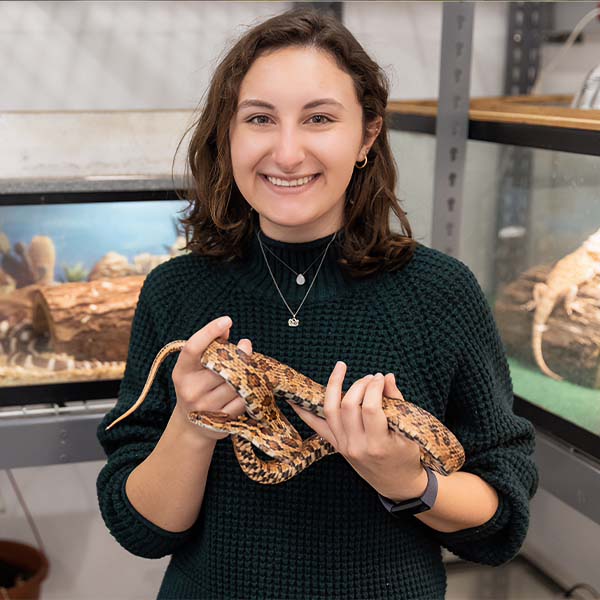Heather Bariso, Environmental Science and Marine Science

Heather Bariso, an Environmental Science and Marine Science major, first met the snakes that live in the Unified Science Center II vivarium during a class demonstration for Poisonous and Venomous Animals.
Over the next three years, she would see those snakes as well as hundreds of terrapins, a variety of other reptiles, amphibians, fish, insects and small mammals during her time as a student worker helping to care for the creatures that support science classes at Stockton.
“There’s never been a day that I wasn’t excited to go into work, and even when I am there I don’t want to leave,” said the Bloomingdale resident.
Bariso always knew she wanted to work with animals, and she found that opportunity at the vivarium where she conducts cleaning, feeding, bathing and medication routines for the resident animals. She assists with rehabilitation of injured animals and prepares creatures for educational lectures and class demos.
“I was gifted Rachel Carson’s Silent Spring when I was in middle school and reading her work really inspired me to want to make a difference. I also forced my family to watch almost every documentary Sir David Attenborough narrated, so seeing all the beauty of the world made me want to experience it one day,” she said.
There’s never been a day that I wasn’t excited to go into work, and even when I am there I don’t want to leave.
As an education intern at The Wetlands Institute in Stone Harbor, she got to introduce visitors to local marine life by bringing creatures to the surface in a seine net and leading interpretive walks through the saltmarsh ecosystem.
An independent study gave her the chance to look further offshore at whales with Melissa Laurino, an animal care specialist and adjunct instructor at Stockton who is a research director and captain at Cape May Whale Watch and Research Center.
Her research project created a heatmap of vessel activity and overlayed whale sightings as points to look for any overlap between the Omega Protein Reduction Fleet, the largest menhaden fishing fleet, and humpback whales in Cape May.
The reduction industry processes menhaden fish into fertilizer, dog food and omega-3 fish oil supplements.
“Menhaden are the primary food source for humpback whales in New Jersey. Our main goal is to determine if there are any overlaps between where whales are sighted the most and where the vessels spend the most time. Once we establish a baseline of where the most frequented areas are, we can propose future studies to see if whales are impacted by competing with the vessels for food or if they use the boats as a locator of food,” she explained.
Bariso spends a lot of her free time outdoors and surrounded by animals. She got certified to become a beekeeper and was introduced to the world of birding from her supervisor John Rokita and Lester Block.
“I will definitely miss being able to walk around Lake Fred and being immersed in nature all the time. I think a majority of my phone storage is filled with photos of sunsets over Fred and turtles basking around the lake,” she said.


